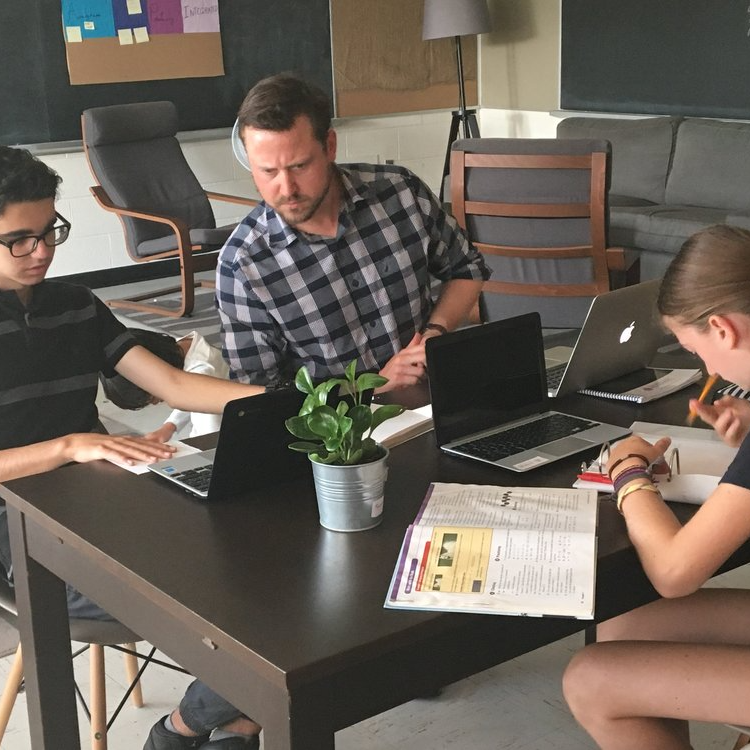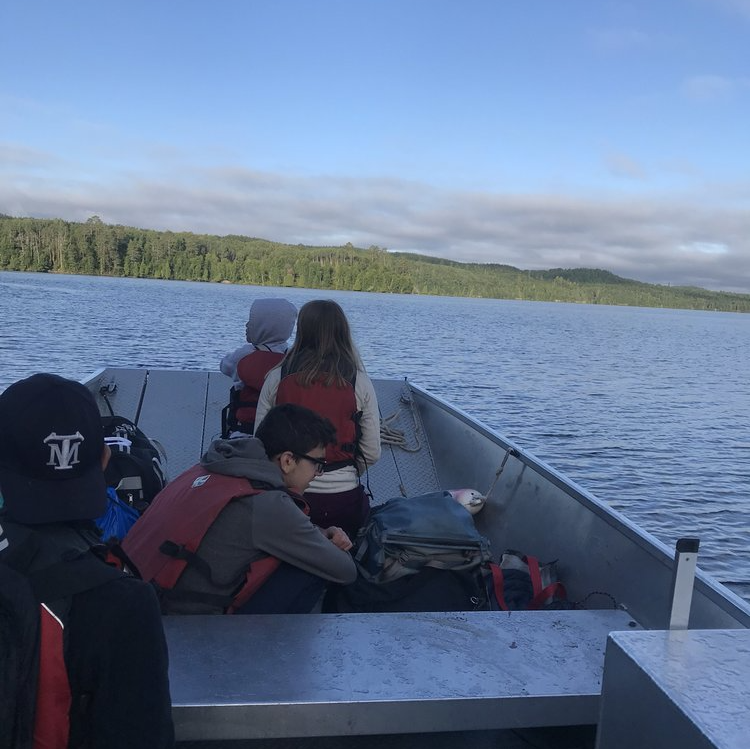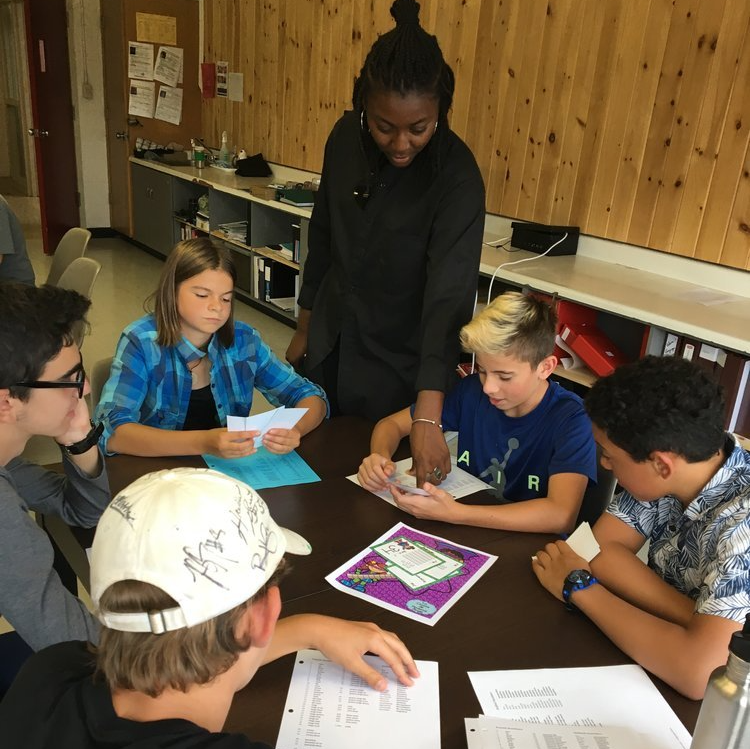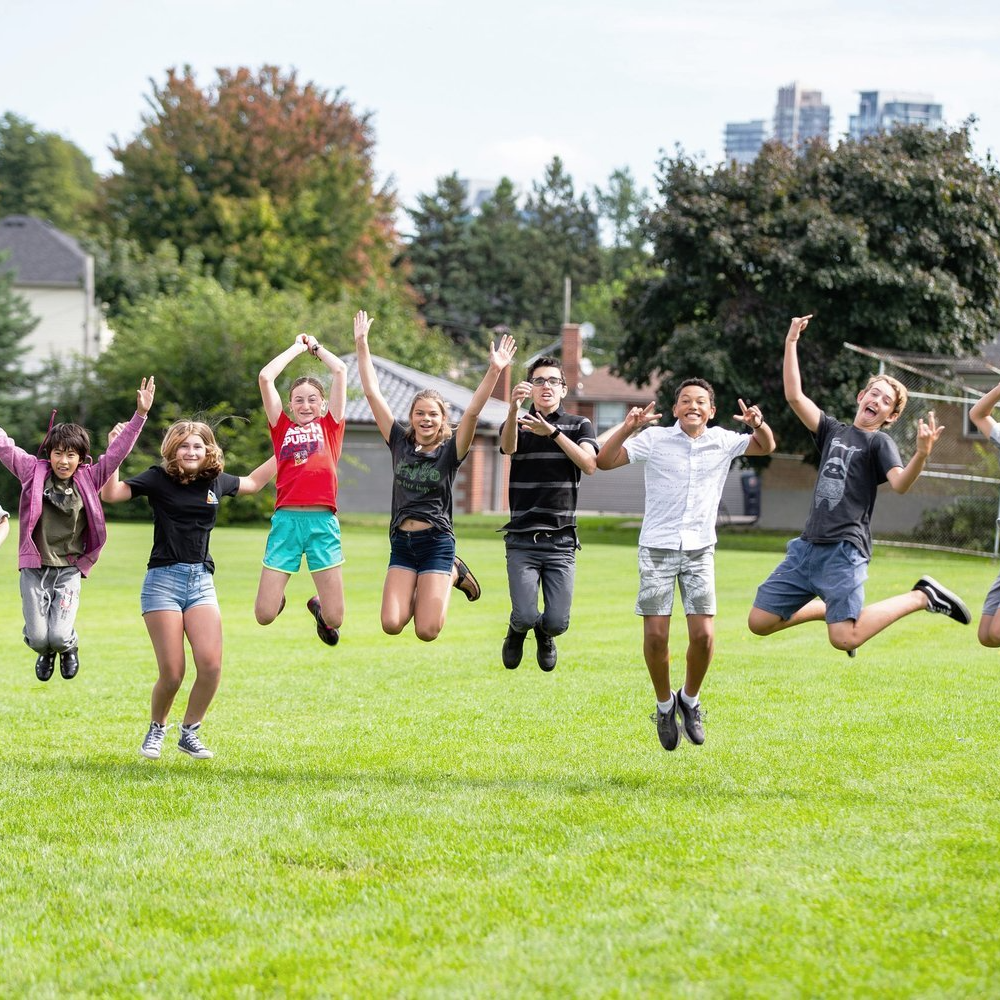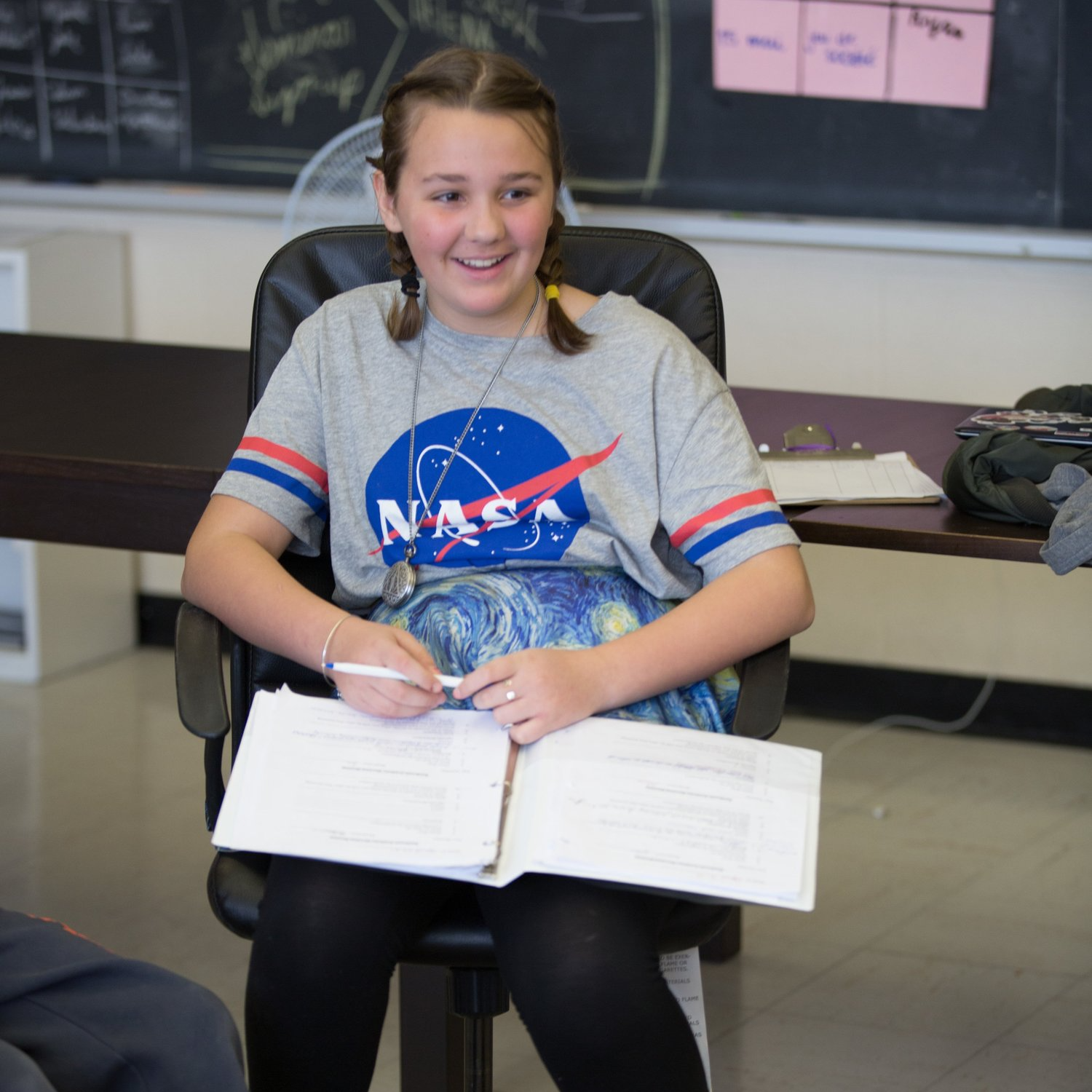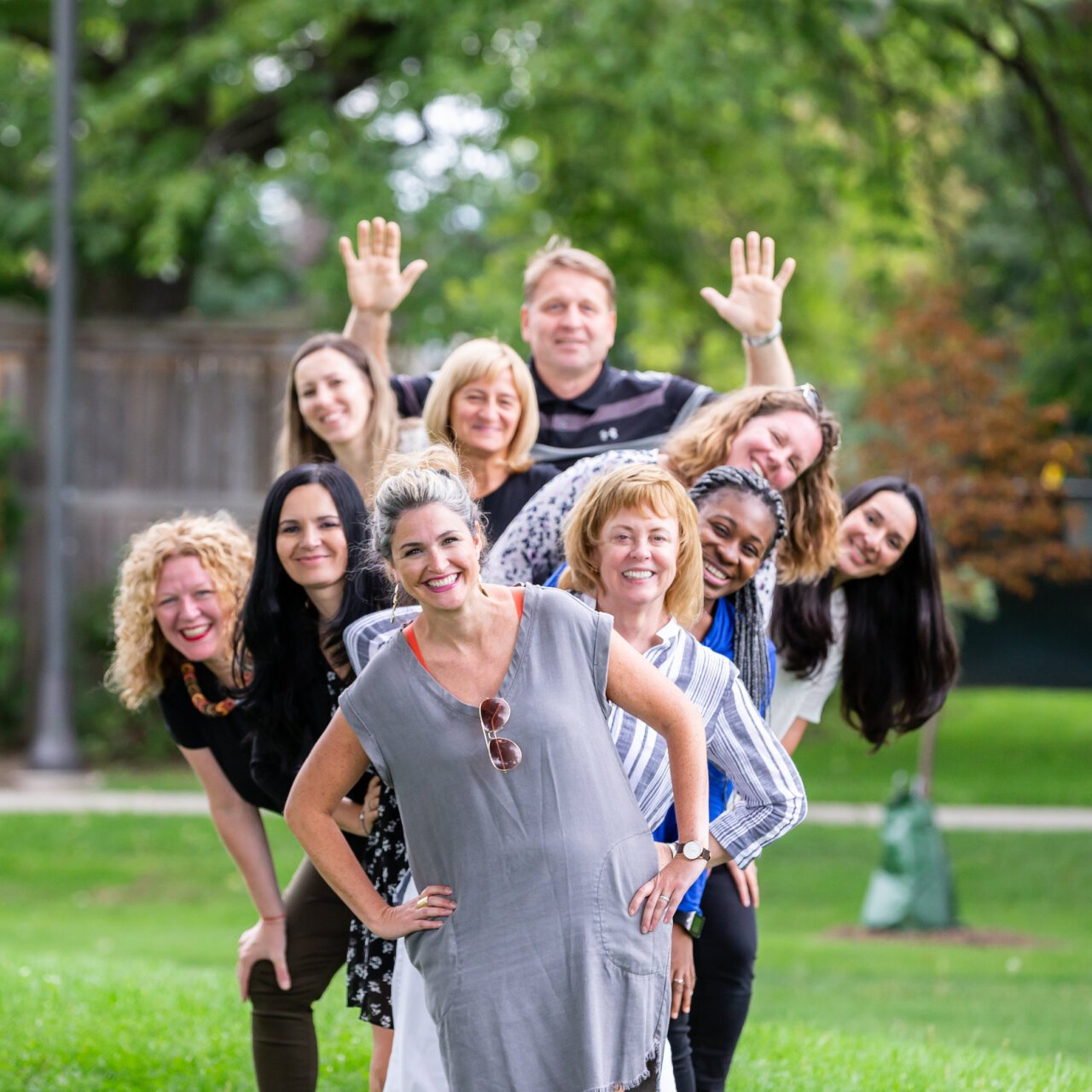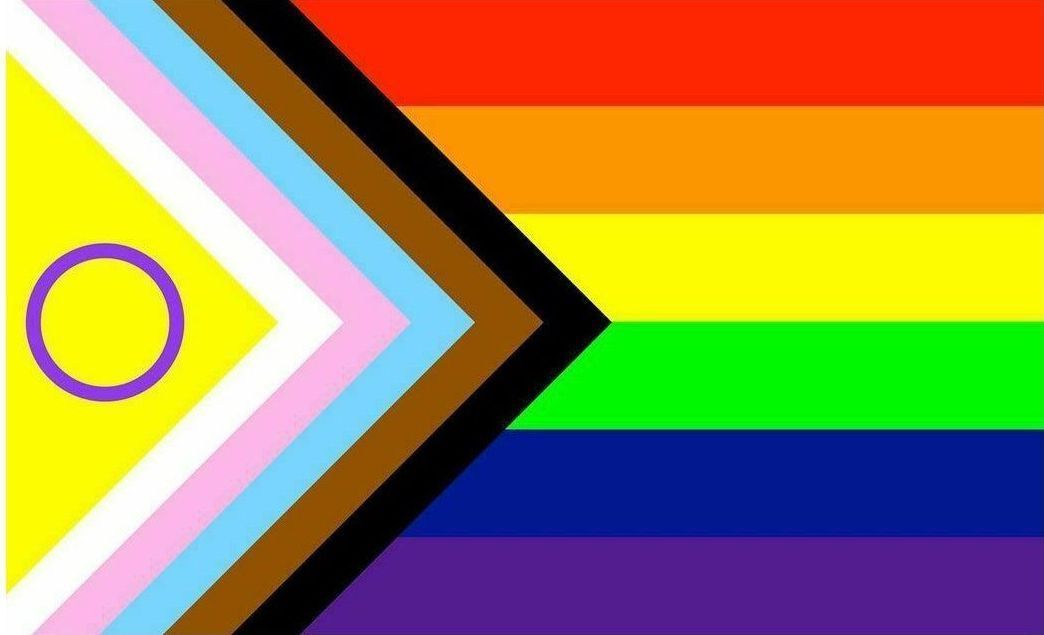Middle School.
12 - 14 years old
“The adolescent must never be treated as a child, for that is a stage of life that he has surpassed.”
- Maria Montessori
Way of Learning.
At this level, group lessons are presented in a workshop model that emphasizes exploration of concepts, sharing of opinions and ideas, and collaborative working. Math, French and Writer's Workshop classes focus on skills to be applied to all aspects of the curriculum.
Students work intensively on areas of personal development as needed. As such, opportunities to review grammatical or spelling rules, mathematical formulae, or other foundational skills arise within each child’s work at different levels. These are reviewed, addressed, and worked on individually.
ADVISOR GROUPS
Students meet regularly to address the concerns of the individuals and of the group as a whole. Often the agenda for these groups will include items such as time management, grace and courtesy, conflict resolution, peer interaction, and evaluation procedures.
The teachers meet with each student on a regular basis to support and challenge the student to meet expectations, reach their goals, and maintain progress through the curriculum. The role of the advisor includes consulting with parents as well.
PEDAGOGY OF PLACE
Adolescent students often struggle with their emerging identities and where they fit in the broader society. A crucial aspect of the middle school philosophy is called the “pedagogy of place,” focused on building an understanding of one’s role within the social, historical, economic, and geographical context of the environment.
This physical connection to place is even more important when viewed through the lens of our current paradoxical society, where people — especially adolescents — are more connected than ever through technology, yet are increasingly disconnected from each other on a concrete, personal level.
Pedagogy of place is implemented through outings throughout the city, the Odyssey Trip in September, participation in a Montessori Model United Nations/Canadian Parliament, and/or a Spring Trip. All students continue to engage in one day per week of Outdoor Education, deepening their relationship with the natural world and situating their learning within a greater context of the human relationship to nature.
ODYSSEY TRIP
Students start each school year with a week-long camping trip, known as the “Odyssey Trip.” Students take ownership of the trip by deciding on hiking/canoeing routes, scheduling meal times and menu planning, and/or choosing a campsite. They are responsible for packing and taking care of dry bags, setting up tents, and organizing food supplies (not to mention meal preparation and cleanup!).
On the Odyssey Trip collaboration, accountability, and personal responsibility are not simply virtues encouraged by teachers within the safe confines of a classroom, but are an absolute necessity in order to have a safe and enjoyable trip.
This is an opportunity for adolescents to discover a little bit about themselves and their place among their peers, and to forge roles away from family. It is also a time to live lessons of geography, geology, history, and anthropology.
SPRING TRIP (ALTERNATE YEARS)
Every two years the Mildenhall Middle School students will take a 3 day trip to a location of their choosing. This trip will be planned, scheduled, and implemented by the students, including making reservations, mapping routes, and planning excursions. Based around a theme of study, each student will present information on a topic of their choosing related to the location; for example, its history, geography, architecture, politics, social services, or economy.
Montessori identifies three main components in the preparation for life. These are: the study of the earth and living things, the study of human progress and the building up of civilization, and the study of the history of humankind (humanity).
A focus on these allows the adolescent to see his or her own place in humanity and fosters in them a knowledge and respect for the earth and all its inhabitants.
School Work.
Generally considered humanities, literature, and sciences, the curriculum is presented as interconnected historically and contextually, providing the adolescent with a growing understanding of his or her place in space and time.
MATHEMATICS AND GEOMETRY
Through the use of math materials, each student is placed at his or her own academic level that will sustain previously learned math skills and appropriately challenge them. This program takes the students well into the study of algebra and geometry and has a large amount of problem solving which supports the other areas of practical implementation of mathematics.
ENGLISH
The studies in English in the areas of writing and reading are generally centred on cultural themes. Supported by a weekly seminar study in small groups, students discuss readings and complete weekly writing through all aspects of the curriculum. The students are required to reflect on themes, events or readings in personal journals, allowing for creative expression and thought. The study of grammar and spelling permeate all aspects of writing.
HUMANITIES
This program encompasses all areas that help define our humanness: history, literature, politics and political geography, current events, and the arts. In alternating years, the focus will be around the transformation of humans through history both internationally and in our own country and city, followed by the growth of Canada as a country from indigenous peoples through to Confederation.
SCIENCE
The science curriculum is based on the principles of the scientific method and discovery. It examines the interdependence of humans and nature, both living and non-living. This involves studies in Ecology, Geology, Botany, Biology, Physics, and Chemistry over the course of the two year program.
MUSIC
The academic study of the history and influence of music is integrated into humanities studies. Additionally, students participate in group music lessons, focused on musicality, enjoyment of music, and performance.
FRENCH
Students continue their French studies in the areas of conversation, reading, writing, and grammar. As much as possible, French is integrated with other cultural studies and is another aspect of study of our own Canadian culture and history.
VISUAL ART
Visual art is integrated into the humanities studies and other areas of creative expression. In addition to weekly art lessons, workshops and outings facilitate contact with professional artists. Students have the opportunity to be exposed to alternative styles of art and to learn more about the lives of people who are professional artists.
PHYSICAL EDUCATION, HEALTH AND WELLNESS
This program looks at the health of the whole adolescent. It includes various physical activities, which are a combination of individual and hopefully lifelong sports, group sports, and the hard work of regular outdoor activities. Taken beyond the traditional in-school physical education program, activities may vary from curling, cross-country, traditional team sports, hiking, canoeing, fitness training, yoga, skiing, track and field, and swimming – all based on student interest. The physical aspect of the program is further complemented by presentations and discussions on human sexuality, nutrition, substance abuse, protection of self and others, and stress management.
ENVIRONMENTAL EDUCATION FOR SUSTAINABILITY
Environmental awareness and environmental education for sustainability is of great import within our adolescent curriculum. The primary goal within this aspect of the curriculum is to inspire and empower the community to take action, by preparing and equipping them with the skills and values to assume responsibility for creating and enjoying a sustainable future. Commitment to sustainability is practiced through a variety of science work projects; i.e. a study of the wetlands and woodlands of Ontario, creation of water conservation technologies, rainwater catchment facilities, recycling facilities, incorporation of solar panels, and the creation of school gardens, just to name a few.
TECHNOLOGY
Students each have access to a Google Chrome laptop with appropriate applications for easy communication and sharing of ideas, projects, and assignments. They are also able to further their research through the Internet. However, it is emphasized that the computer is only one of many research tools. In addition, workshops on software use for word processing, mathematics, art and graphic design, and public speaking presentations are provided.
MONTESSORI MODEL UNITED NATIONS/CANADIAN PARLIAMENT (ALTERNATE YEARS)
Mildenhall Montessori Middle School students have the opportunity to take part in an international conference: the Montessori Model United Nations (MMUN) or a Model Canadian Parliamentary Session.
Research into relevant current legislation, drafting resolutions, making speeches, negotiating with allies and adversaries, and resolving conflicts — these all happen in the interest of international or regional cooperation. The Montessori format differs from the traditional format in that the students achieve resolutions based on collaboration and negotiation rather than debate.
The unit culminates with a three-day trip to New York City or Ottawa where students will have the opportunity to give speeches in the actual UN General Assembly or Canadian Parliament.
Adolescence.
Dr Montessori observed that adolescents need:
- Meaningful work plus opportunities to contribute to their communities
- Community building experiences encompassing reliable and close relationships with peers and at least one adult
- Opportunities to express themselves creatively as new interests, thoughts, and emotions unfold
- To acquire flexible and inquiring habits of mind
- To develop a personal vision – to begin to think about their lives as future adults
- Physical activity coupled with time set aside for relaxation and contemplation
A core theme of the approach is that at all levels education is a preparation for life. Our Middle School is an authentic community experience for adolescents with an aim to not only prepare them for high school or even university, but for life.
Admissions.
Middle School is currently a Tuition free program. Some fees do apply. Please book a phone call to learn more about our Middle School and the admissions process, and please request our tuition and fee schedule to learn about Middle School related fees.

